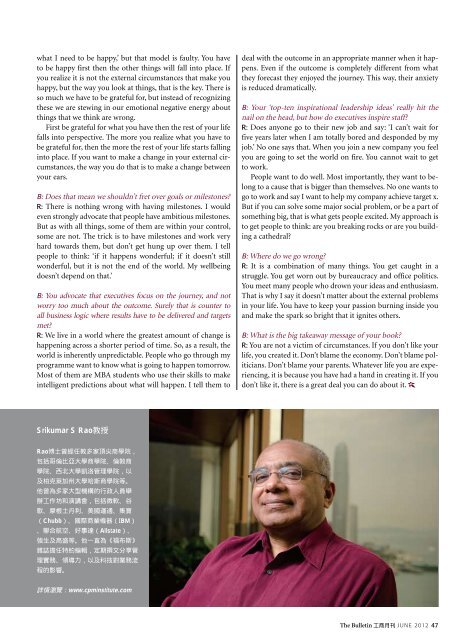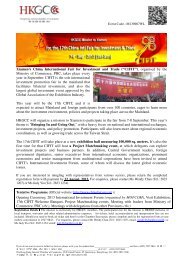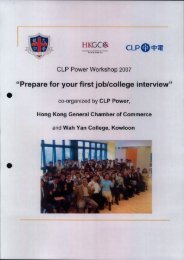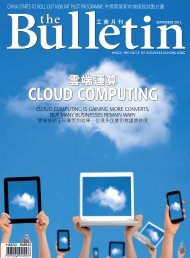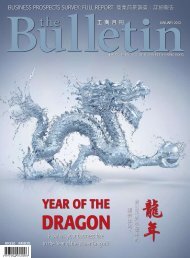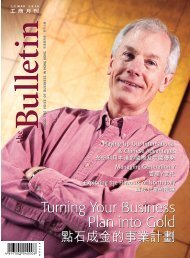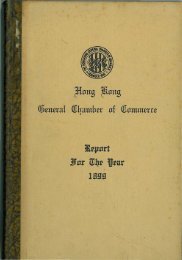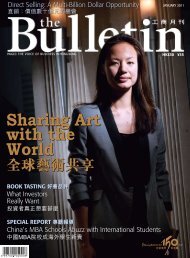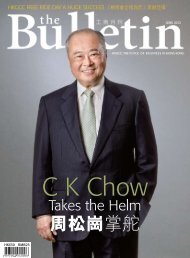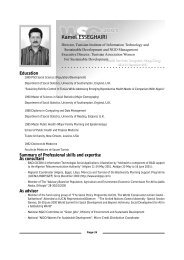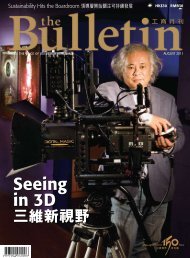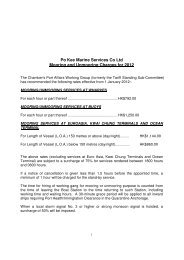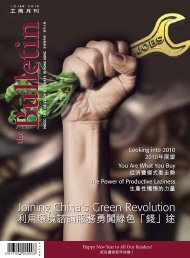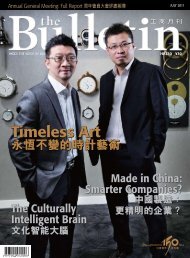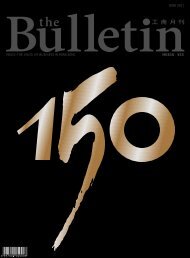é¦æ¸¯ç¸½åæå ¨ç¨çºæ¨ - The Hong Kong General Chamber of Commerce
é¦æ¸¯ç¸½åæå ¨ç¨çºæ¨ - The Hong Kong General Chamber of Commerce
é¦æ¸¯ç¸½åæå ¨ç¨çºæ¨ - The Hong Kong General Chamber of Commerce
You also want an ePaper? Increase the reach of your titles
YUMPU automatically turns print PDFs into web optimized ePapers that Google loves.
what I need to be happy,’ but that model is faulty. You haveto be happy first then the other things will fall into place. Ifyou realize it is not the external circumstances that make youhappy, but the way you look at things, that is the key. <strong>The</strong>re isso much we have to be grateful for, but instead <strong>of</strong> recognizingthese we are stewing in our emotional negative energy aboutthings that we think are wrong.First be grateful for what you have then the rest <strong>of</strong> your lifefalls into perspective. <strong>The</strong> more you realize what you have tobe grateful for, then the more the rest <strong>of</strong> your life starts fallinginto place. If you want to make a change in your external circumstances,the way you do that is to make a change betweenyour ears.B: Does that mean we shouldn’t fret over goals or milestones?R: <strong>The</strong>re is nothing wrong with having milestones. I wouldeven strongly advocate that people have ambitious milestones.But as with all things, some <strong>of</strong> them are within your control,some are not. <strong>The</strong> trick is to have milestones and work veryhard towards them, but don’t get hung up over them. I tellpeople to think: ‘if it happens wonderful; if it doesn’t stillwonderful, but it is not the end <strong>of</strong> the world. My wellbeingdoesn’t depend on that.’B: You advocate that executives focus on the journey, and notworry too much about the outcome. Surely that is counter toall business logic where results have to be delivered and targetsmet?R: We live in a world where the greatest amount <strong>of</strong> change ishappening across a shorter period <strong>of</strong> time. So, as a result, theworld is inherently unpredictable. People who go through myprogramme want to know what is going to happen tomorrow.Most <strong>of</strong> them are MBA students who use their skills to makeintelligent predictions about what will happen. I tell them todeal with the outcome in an appropriate manner when it happens.Even if the outcome is completely different from whatthey forecast they enjoyed the journey. This way, their anxietyis reduced dramatically.B: Your ‘top-ten inspirational leadership ideas’ really hit thenail on the head, but how do executives inspire staff?R: Does anyone go to their new job and say: ‘I can’t wait forfive years later when I am totally bored and desponded by myjob.’ No one says that. When you join a new company you feelyou are going to set the world on fire. You cannot wait to getto work.People want to do well. Most importantly, they want to belongto a cause that is bigger than themselves. No one wants togo to work and say I want to help my company achieve target x.But if you can solve some major social problem, or be a part <strong>of</strong>something big, that is what gets people excited. My approach isto get people to think: are you breaking rocks or are you buildinga cathedral?B: Where do we go wrong?R: It is a combination <strong>of</strong> many things. You get caught in astruggle. You get worn out by bureaucracy and <strong>of</strong>fice politics.You meet many people who drown your ideas and enthusiasm.That is why I say it doesn’t matter about the external problemsin your life. You have to keep your passion burning inside youand make the spark so bright that it ignites others.B: What is the big takeaway message <strong>of</strong> your book?R: You are not a victim <strong>of</strong> circumstances. If you don’t like yourlife, you created it. Don’t blame the economy. Don’t blame politicians.Don’t blame your parents. Whatever life you are experiencing,it is because you have had a hand in creating it. If youdon’t like it, there is a great deal you can do about it.Srikumar S Rao 教 授Rao 博 士 曾 經 任 教 多 家 頂 尖 商 學 院 ,包 括 哥 倫 比 亞 大 學 商 學 院 、 倫 敦 商學 院 、 西 北 大 學 凱 洛 管 理 學 院 , 以及 柏 克 萊 加 州 大 學 哈 斯 商 學 院 等 。他 曾 為 多 家 大 型 機 構 的 行 政 人 員 舉辦 工 作 坊 和 演 講 會 , 包 括 微 軟 、 谷歌 、 摩 根 士 丹 利 、 美 國 運 通 、 集 寶(Chubb)、 國 際 商 業 機 器 (IBM)、 聯 合 航 空 、 好 事 達 (Allstate)、強 生 及 高 盛 等 。 他 一 直 為 《 福 布 斯 》雜 誌 擔 任 特 約 編 輯 , 定 期 撰 文 分 享 管理 實 務 、 領 導 力 , 以 及 科 技 對 業 務 流程 的 影 響 。詳 情 瀏 覽 :www.cpminstitute.com<strong>The</strong> Bulletin 工 商 月 刊 June 2012 47


